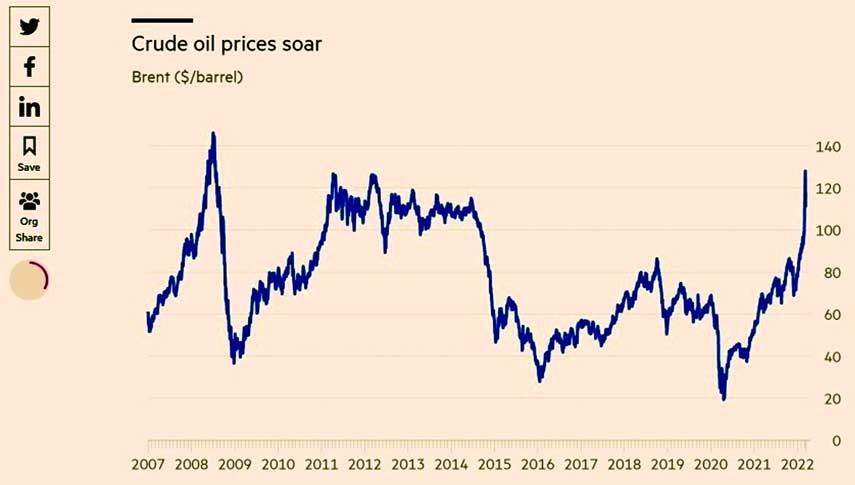
Economic recovery in Bangladesh is gaining momentum, as the third wave of Covid-19 pandemic recedes. However, rising crude oil and commodity prices due to the Russia-Ukraine conflict poses serious risk to economic outlook, said economists.
They said, Bangladesh heavily depends on oil import to help quench the growing energy demand, while rising price of oil is set to widen its trade deficit, put more upside pressure on inflation and government finances.
Recently, crude oil prices jumped to $139 a barrel, the highest level for almost 14 years, amid fears of supply crunch from Russia’s invasion of Ukraine.
Earlier, Bangladesh government planned to import 6.4 million metric tons of fuel oil for the calendar year 2022.
In calendar year 2021, Bangladesh Petroleum Corporation (BPC) imported a total of 5.485 million metric tons (MT) of petroleum products. Of the total quantity, 4.544 was million MT and 1.3 million MT was crude oil.
Economists said, Bangladesh’s petroleum import bill will go up significantly in 2022 for higher crude oil prices in global market and higher quantity of import.
They said, the country may have to spend over $4.0 billion to import the proposed 6.4 million MT of petroleum products.
Bangladesh’s oil import bill was US$ 3.424 billion.
“For oil-import dependent Bangladesh, higher global prices would not only increase the country’s import bill, but also lead to a weaker currencyand further weigh on current account deficit,” said economist Dr Zahid Hussain. Bangladesh’s current account deficits during July-January period of ongoing fiscal year reached $10 billion due to the escalation of trade deficit and falling remittances.
The country’s trade deficit stood at nearly $18.7 billion between the months of July and January in FY 2021-22 and between July and January, expatriate Bangladeshis sent remittances amounting to $11.94 billion, down 19.88 per cent year-on-year.
“Another major concern for Bangladesh is the impact that higher oil prices will have on inflation,” said Dr Zahid, adding, “Oil at $139 a barrel is certainly destabilsing for economy given the adverse impact.”
When asked, he said, that the government may not have too many options in the face of rising oil prices. There are two policy options. Firstly, the government can finance the increased price by fuel subsidy and secondly, it can pass through the consumers by raising oil pricesin domestic market.
“In case of second option, the impact will be huge on logistics sector with increase in retail prices of petrol and diesel. Transportation and production costs will surge. Companies will pass the costs to their customers and ultimately they will be the victim.
“But, the government should keep a close watch on the fluctuations in the global prices of crude oil. It should refrain from taking any hurried decisions on pricing of petrol and diesel to safeguard the interest of the common man,” said Dr Zahid, former lead economist of World Bank’s Dhaka office.
He mentioned that from crude oil to grains and edible oil, commodities have been rocked by Russia’s invasion of Ukraine and the sweeping US and European sanctions on Russia. “Surging commodity prices, supply chain disruptions and an inflationary crunch are likely to strain consumers in Bangladesh and affect daily lives.
He noted that rising commodity prices would reduce disposable income of consumers and thereby lower consumer demand.
“Bangladesh economy braces for a higher inflation owing to soaring costs of oil, gas and grains amid Russia’s invasion of Ukraine,” said Dr Ahsan Mansur, Executive Director of Policy Research Institute (PRI).
General inflation rose to a 14-month high of 6.05 per cent in December last year, with non-food inflation reaching 7 per cent, a six-year high, and food-inflation to 5.46 per cent, the highest in six months.
Despite soaring prices of food and other daily commodities, general inflation in Bangladesh in January fell to 5.86 per cent from 6.05 per cent in December, according to the Bangladesh Bureau of Statistics (BBS).
However, the South Asian Network on Economic Modeling (SANEM) claimed that the overall inflation rate in the country is more than double from the calculation provided by Bangladesh Bureau of Statistics (BBS).
The SANEM claimed that the overall inflation rate in urban areas is now 12.47 per cent, which is 12.10 per cent in rural areas in Bangladesh.
The government aimed to keep the inflation rate within 5.30 per cent in FY22.
“Inflation is gradually rising in the country owing to high food and commodity prices,” said Dr Mansur, adding, “Inflationary pressures are likely to rise further in the near due to strain in global supply chains as a result of Russia-Ukraine conflict.”
When asked, he said, “Bangladesh is bracing for the economic fallout of Russia’s military attacks in Ukraine, which pushed crude prices 14-year high. The country stands to be the hardest hit country in Asia by the latest surge, which will hamper economic growth and push inflation higher.
He also said that as an open economy, Bangladesh will not be able to totally insulate itself from the impact of higher global costs. “It is crucial that we strengthen our defences against such external shocks.”

